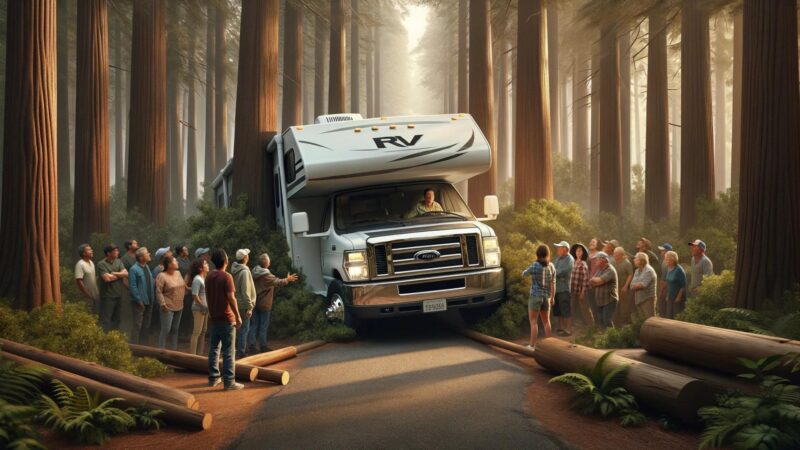Table of Contents Show
Have you ever scoffed at a late arrival in the campground that wakes everyone up? Or have you ever shaken your head in disbelief when you saw a pair of wheels that weren’t chocked at a campground?
These are sure signs of an RV newbie. Today, we will share a few ways to spot a newcomer and give tips to help these new friends make their first few trips uneventful.
Let’s dive in!
What Defines An RV Newbie?
While you may not want to be assigned a label, if you’ve never RVed before, it’s likely you’ll be called an RV newbie at some point. Inexperienced RVers will face challenges that seasoned RVers have overcome.
That’s not to say that RVers who have traveled extensively don’t have mishaps. But RV newbies will encounter problems they haven’t experienced before.
Because many RV newbies haven’t yet learned the ropes of camping, they tend to behave differently. It’s easy to spot a new RVer at a campground.
While experienced RVers avoid specific scenarios and understand proper etiquette, there’s a learning curve for newbies.
5 Ways To Spot An RV Newbie
Whether you’re new to the RV lifestyle or are a veteran RVer, you’ll recognize these five ways to spot an RV newbie.
These might be things you’ve done yourself or witnessed other campers doing. Let’s dive in!
1. They Pull In After Dark
Experienced RVers usually follow the 2-2-2- or 3-3-3 rule of RVing. Using this guideline, travelers ensure they don’t arrive at a new destination later than 2 or 3 p.m.
Why does this matter?
No one wants to set up in an unfamiliar location in the dark. It’s more challenging to back into a site, level the RV, and set up your gear. You can easily spot an RV newbie arriving after dark and they’re struggling to get into the campsite.
Additionally, many campground offices are also closed by dark.
So, not only are you making the setup more difficult by arriving late, but you’ll also have to self-check in. If you’ve never done this before as an RV newbie, you’ll likely be unsure of where to go and what to do.
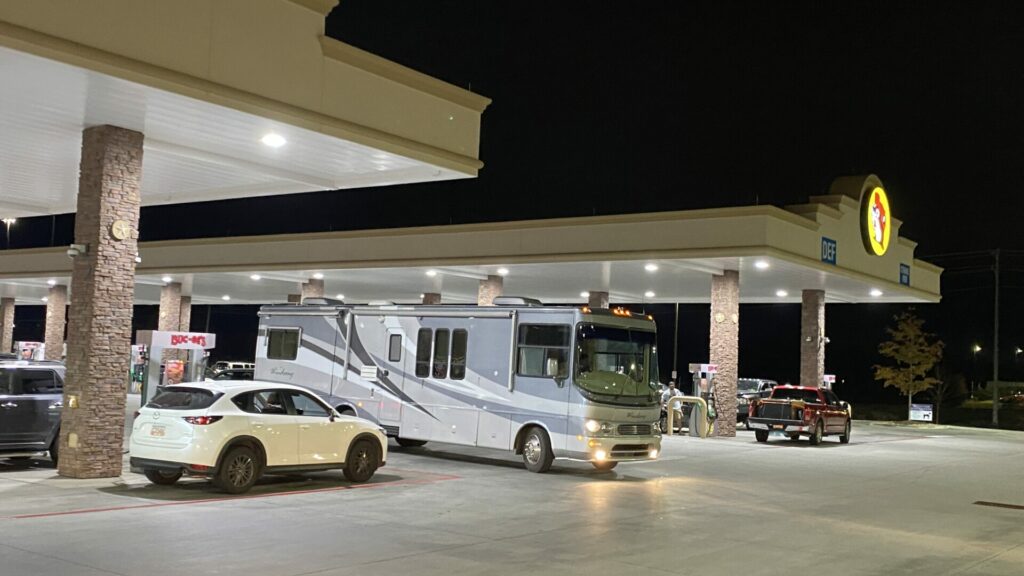
2. They Dont Have Enough Gear
For those new to RVing, the road can also bring a series of unexpected challenges, particularly when it comes to being adequately prepared with the right gear or RV products.
Unlike seasoned travelers who have refined their inventory to a tee, newcomers often navigate through trial and error, discovering what they truly need instead of what they thought they would need.
Seasoned RVers can easily spot a newbie when he needs do something like move his RV backward or forward to reach a sewer connection or power pedestal after being settled already.
RVers who have traveled extensively know what they need and don’t need. They have either taken the length of their hoses or cables into account or carry extensions to ensure they can reach even the furthest connection.
We remember this causing us issues when the power pedestals were way behind our site. We needed to borrow a 50-amp extension cord from our experienced neighbor until we could get our own when Camping World opened after the weekend.
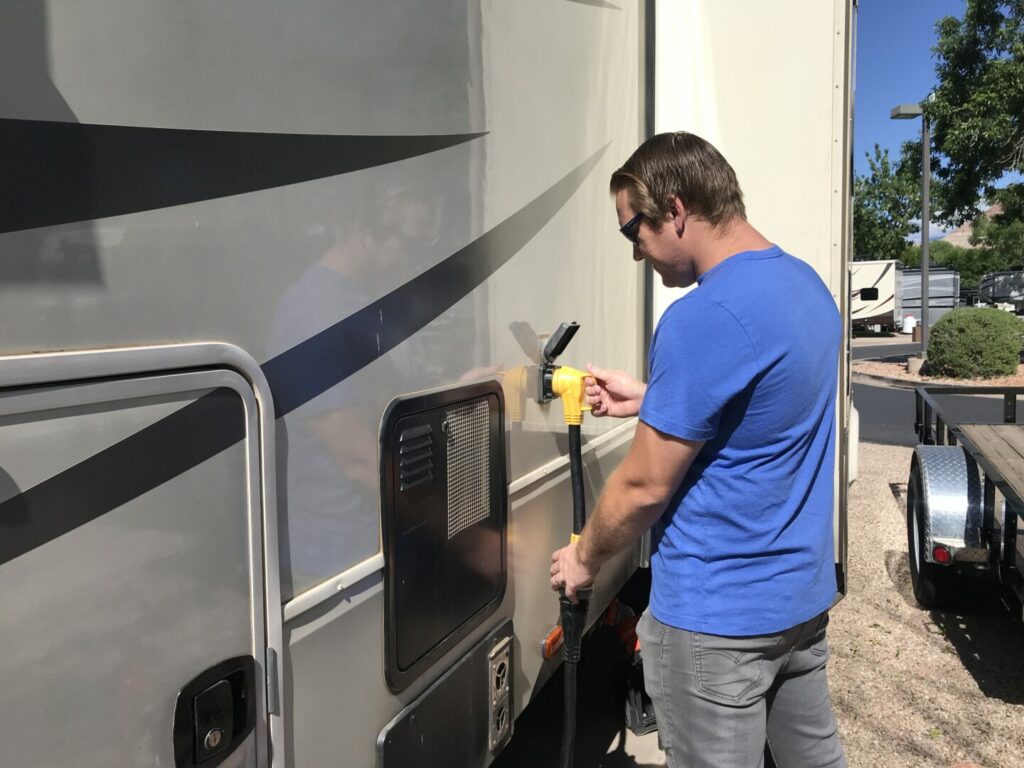
3. They Park Too Close To Obstacles
Have you ever watched a neighbor back into a campsite? If so, you’ve probably spotted an RV newbie because they hit the power pedestal when it’s time to extend the slides.
Or perhaps when it’s time to put out the awning, it hits a tree branch. RV newbies tend to park too close to obstacles and don’t know the size of their rig.
Seasoned RVers have experienced these problems and have learned to park a certain distance away to ensure they don’t have to move their RV.
It’s no fun to have to hook up your trailer again just to move it over two inches!
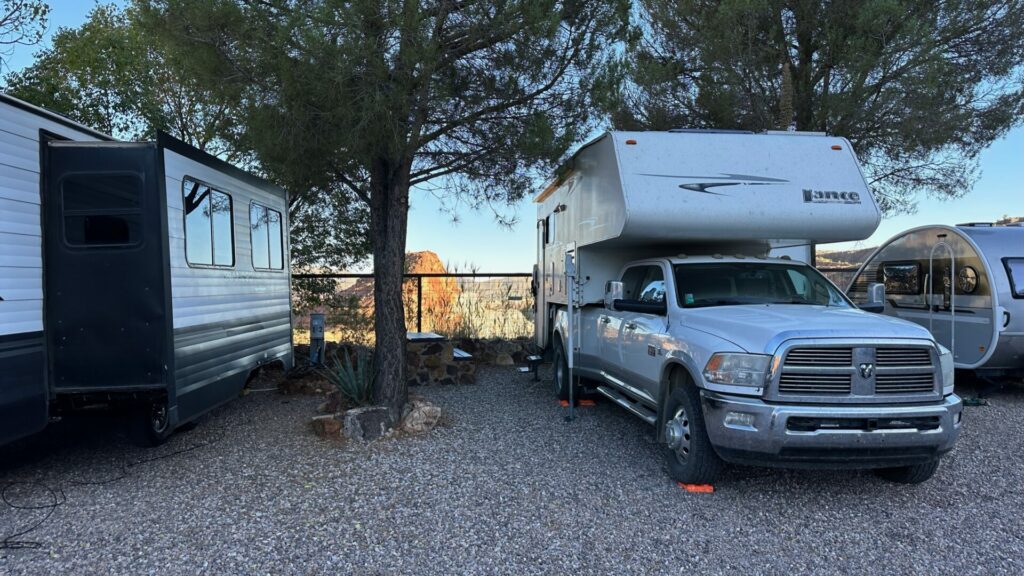
4. They Don’t Follow Campground Etiquette
Another way to spot an RV newbie is how they act around a campground. Many new RVers don’t know the unwritten rules of camping.
They might walk through someone’s campsite to take a shortcut to the playground or leave trash outside overnight. They may allow their dog to poop in someone’s campsite and not clean up after it.
RV newbies frequently do these things because they don’t know the proper etiquette yet. Sadly, seasoned RVers also don’t follow these unwritten rules either, and they should know better!
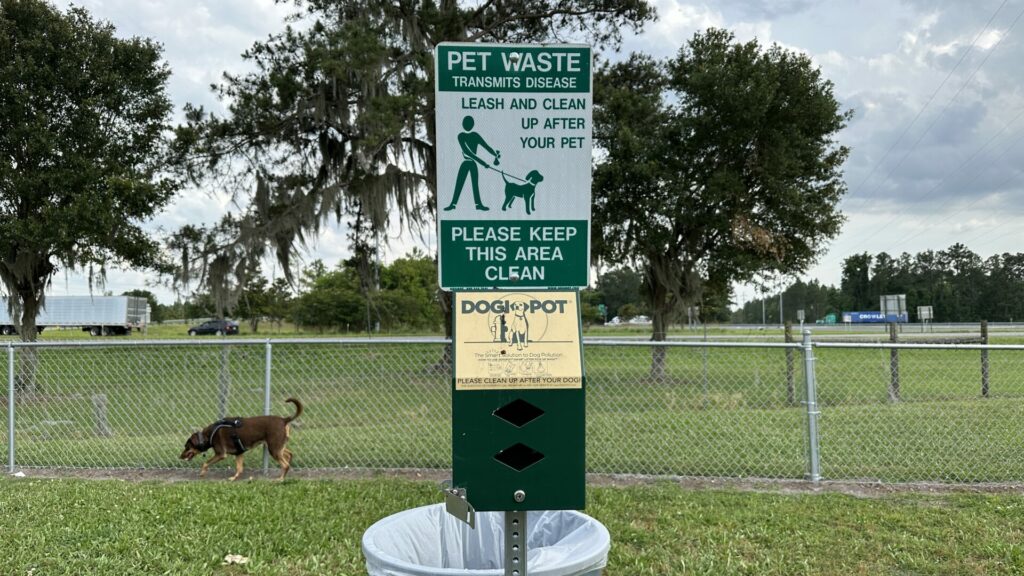
5. They Don’t Properly Level Their RV
Finally, you can spot an RV newbie by how they level their RV. If they drive a motorhome, the front tires may be raised off the ground without any blocks underneath.
Newbies may not level their rig and assume it will be fine for a weekend. They may not use the proper leveling tools like blocks or chocks.
Sometimes, it can be pretty scary to walk past an RV and see it tilting sideways or see the wheels not secured adequately with chocks.
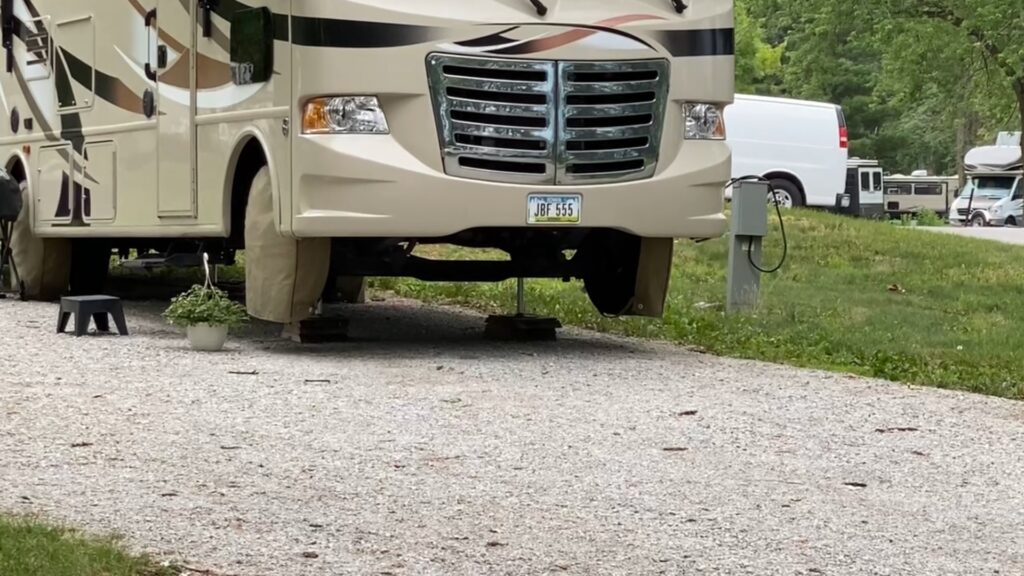
Tips If You’re Heading Out On Your First Camping Trip
If you’re an RV newbie, we have a few tips to help make your first camping trip enjoyable and safe. First, book your first reservation close to home. Don’t attempt a cross-country journey if you’ve never taken out your RV.
By staying close to home, you can run back to the house if you forget anything. You’ll also be able to go home early should something unexpected happen, like a propane leak, slide malfunction, or air conditioning problem.
You’ll need a few of these short trips to work out the kinks in your new (or new-to-you) RV and learn the systems and procedures of RVing in general. They’re adequately named shakedown trips, so you can figure out any problems and learn how to overcome them.
Our next tip is to learn how to use every system in your RV. Even if it’s 90 degrees in July, operate the furnace and make sure it functions. Run the microwave even if you don’t need to heat anything.
Use the automatic leveling system if you have one. By running all of the systems, you ensure they all work correctly. You’re also learning how to use them so that when the time comes, you’re confident that you know what to do.
If you’re an RV newbie, you’ll also want to make reservations early. Know your RV’s size and book a campsite that’s plenty big enough to accommodate slide-outs and awnings. You’ll need to know your rig’s length, width, and height to ensure you can safely navigate the campground and park in a site.
We also suggest calling to make a reservation rather than doing it online. That way, you can ask questions about the height of any tree branches and the slope of the campsite. Tell the staff member you’re new to RVing.
Finally, we recommend renting an RV before buying. This way, you’re not going blindly into RV ownership. You’ve experienced the smaller interior space. You’ve dumped the tanks before. It’s not entirely foreign territory once you buy your rig.
Don’t Be Afraid To Ask For Help
RVers are a great community. If you’re at a campground and have a question, seek help from a neighbor. Seek out Facebook groups with RVers to ask questions or get suggestions.
Especially if you’re traveling solo, use this RVing community to your advantage. While seasoned travelers may get a kick out of watching you back into a site, they’ll also be the first to lend a hand to help if you hit a tree branch.
Give the RV Newbies a Break
We were also RV newbies at one point. If you see a new traveler at a campground, give them some slack. Be helpful and encouraging rather than pointing fingers or getting angry.
And if you’re a newbie, take the assistance. If someone wants to help guide you into a campsite, let them do so. If several people in a Facebook group swear by a product, you may love it, too.
RV newbies and seasoned veterans make up this fantastic community of travelers!




